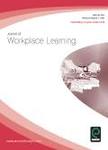版权所有:内蒙古大学图书馆 技术提供:维普资讯• 智图
内蒙古自治区呼和浩特市赛罕区大学西街235号 邮编: 010021

作者机构:NIOSH Pittsburgh PA 15236 USA
出 版 物:《JOURNAL OF WORKPLACE LEARNING》 (在职学习杂志)
年 卷 期:2016年第28卷第5期
页 面:294-306页
学科分类:12[管理学] 120202[管理学-企业管理(含:财务管理、市场营销、人力资源管理)] 0202[经济学-应用经济学] 02[经济学] 0401[教育学-教育学] 1202[管理学-工商管理] 1201[管理学-管理科学与工程(可授管理学、工学学位)]
基 金:Intramural CDC HHS [CC999999] Funding Source: Medline
主 题:Computer based learning Training evaluation Training climate
摘 要:Purpose - This paper aims to contribute to a general understanding of mental practice by investigating the utility of and participant reaction to a virtual reality maintenance training among underground coal mine first responders. Design/methodology/approach - Researchers at the National Institute for Occupational Safety and Health s Office of Mine Safety and Health Research (OMSHR) developed software to provide opportunities for mine rescue team members to learn to inspect, assemble and test their closed-circuit breathing apparatus and to practice those skills. In total, 31 mine rescue team members utilized OMSHR s BG 4 Benching Trainer software and provided feedback to the development team. After training, participants completed a brief post-training questionnaire, which included demographics, perceived training climate and general training evaluation items. Findings - The results overall indicate a generally positive reaction to and high perceived utility of the BG 4 benching software. In addition, the perceived training climate appears to have an effect on the perceived utility of the mental practice virtual reality game, with benchmen from mines with more positive training climates reporting greater perceived efficacy in the training s ability to prepare trainees for real emergencies. Originality/value - This paper helps to broaden current applications of mental practice and is one of the few empirical investigations into a non-rehabilitation virtual reality extension of mental practice. This paper also contributes to the growing literature advocating for greater usage of accurate and well-informed mental practice techniques, tools and methodologies, especially for occupational populations with limitations on exposure to hands-on training.